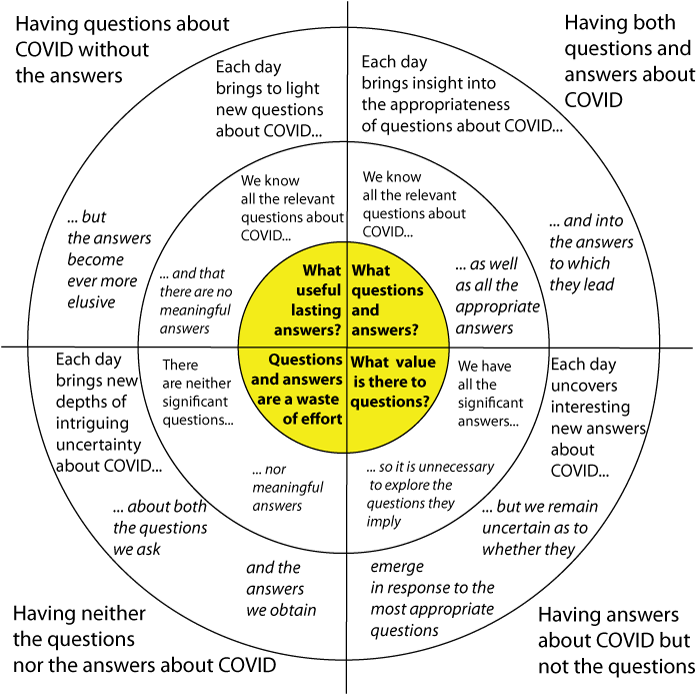Sustaining the Quest for Sustainable Answers on COVID-19
TRANSCEND MEMBERS, 17 Aug 2020
Anthony Judge | Laetus in Praesens - TRANSCEND Media Service
Beyond the Divisive Preoccupation with Unquestionable Assertions and Unanswered Questions
Introduction
17 Aug 2020 – The early months of 2020 have seen no lack of questions and answers with respect to the coronavirus pandemic. Especially problematic is the process whereby discourse in this regard has been characterized by misinformation of every kind — and from every authority. This has been recognized to a degree by the UN Secretary-General ((Hatred going viral in ‘dangerous epidemic of misinformation’ during COVID-19 pandemics, UN News, 14 April 2020; U.N. Chief Targets ‘Dangerous Epidemic Of Misinformation’ On Coronavirus, NPR, 14 April 2020).
However it remains unclear what information from which official source has contributed to this condition. An investigation into the role of the World Health Organization is underway (WHO launches independent inquiry into global response to pandemic, Financial Times, 10 July 2020; WHO approves call for inquiry into global coronavirus response, CNN, 19 May 19, 2020; Helen Clark: WHO coronavirus inquiry aims to ‘stop the world being blindsided again’, The Guardian, 10 July 2020).
The dynamics are especially evident in discourse at the regional and national levels — with many expressed concerns regarding the confusion. The situation has been further compounded by the right assumed by certain authorities to assert that some answers are unquestionably “true” and others “false”. The latter may well be subject to various forms of censorship in order to focus attention on what is held to be “true”. Those propagating information held to be “false” may be indicted and subject to prosecution. Those asking questions, which undermine what is held to be a consensus, may be subject to pressures which oblige them to be silent. This process contrasts curiously with that relating to climate change over recent years.
Especially problematic is the extent to which it is no longer feasible to frame any set of unanswered questions or to question those answers which are deemed unquestionable. There is no authority which is empowered to receive or process any such checklist — since all questions and answers are subject to the dynamics described. Such checklists become the victims of a process about which there is little perspective. It is in this sense that the pandemic can be fruitfully explored in memetic terms, as previously suggested (COVID-19 as a Memetic Disease — an epidemic of panic: learning from terrorism, communism. fascism, and evil, as pandemics of the past, 2020). Indeed, although the strategic response has been widely framed in terms of warfare, it could be said that the process merits recognition as an example of memetic warfare.
The following argument in relation to COVID-19 therefore avoids asking questions in the conventional manner (or noting those which have been asked) or presenting answers (or noting those which have been presented). The approach taken is to revisit and adapt an earlier exercise of some relevance (Sustaining the Quest for Sustainable Answers, 2003). This took the form of a diagram which has been modified below.
TO CONTINUE READING Go to Original – laetusinpraesens.org
Tags: COVID-19, Coronavirus
DISCLAIMER: The statements, views and opinions expressed in pieces republished here are solely those of the authors and do not necessarily represent those of TMS. In accordance with title 17 U.S.C. section 107, this material is distributed without profit to those who have expressed a prior interest in receiving the included information for research and educational purposes. TMS has no affiliation whatsoever with the originator of this article nor is TMS endorsed or sponsored by the originator. “GO TO ORIGINAL” links are provided as a convenience to our readers and allow for verification of authenticity. However, as originating pages are often updated by their originating host sites, the versions posted may not match the versions our readers view when clicking the “GO TO ORIGINAL” links. This site contains copyrighted material the use of which has not always been specifically authorized by the copyright owner. We are making such material available in our efforts to advance understanding of environmental, political, human rights, economic, democracy, scientific, and social justice issues, etc. We believe this constitutes a ‘fair use’ of any such copyrighted material as provided for in section 107 of the US Copyright Law. In accordance with Title 17 U.S.C. Section 107, the material on this site is distributed without profit to those who have expressed a prior interest in receiving the included information for research and educational purposes. For more information go to: http://www.law.cornell.edu/uscode/17/107.shtml. If you wish to use copyrighted material from this site for purposes of your own that go beyond ‘fair use’, you must obtain permission from the copyright owner.
